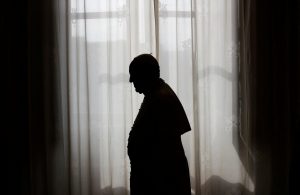Up until just over a month ago, Najae Maguta had planned to sit out the November election despite voting for President Biden in 2020. She felt he was too old, and she was frustrated with his support for Israel’s war in Gaza. Inflation had strained her buying power.
“I spent $200 on groceries, and it didn’t even fill my fridge,” said Maguta, a 30-year-old nanny in South Philadelphia. “Gas prices aren’t easy. I can’t fill my tank.”
When Vice President Kamala Harris replaced Biden at the top of the ticket, Maguta’s feelings changed.
“I had to make sure I was registered to vote,” she said. “If Harris wins, I definitely think this country will be taking a better turn.”
A new Wall Street Journal survey found that while a majority of voters continue to hold negative views about the direction of the country and the economy, there has been a slight uptick in optimism. Nearly 30% of respondents said the country is headed in the right direction, a 9-point jump from early July, while 61% said the country is headed in the wrong direction, a 9-point decrease. The figures reflect the most favorable view of the country’s trajectory since at least November 2021.
The shift was largely driven by Democrats, who recorded a 13-point jump in the share that said the country was headed in the right direction when compared with early July. A majority of independents still believe the country is headed in the wrong direction, but the number of independents who said the country is headed in the right direction rose by 9 points from early July.
The poll reinforced that Harris’s entry into the race after Biden, 81, stepped aside in the midst of concern over his age has ushered in a wave of enthusiasm among Democrats. Republicans, meanwhile, have closed ranks behind former President Donald Trump after he survived an assassination attempt in July.
Pamela Evans, a 65-year-old registered Republican in Canton, Ga., voted for former South Carolina Gov. Nikki Haley in the Republican primary despite her support for Trump in previous elections. But Evans, who is retired, said she is now “completely behind” Trump even as she acknowledged the former president can be unpredictable.
“He’s the best option,” she said. “It’s not like I’m looking for a husband for my daughter. I’m looking for the best president for the country.”
Both parties’ conventions were underpinned by a renewed sense of unity and fresh optimism over their chances of winning the White House. They also offered divergent characterizations of the country’s direction over the past four years and its future.
When Democrats gathered in Chicago in August, the mood was euphoric as Harris accepted the nomination following high-profile appearances by the Clintons, the Obamas and such celebrities as Oprah Winfrey , Pink and Kerry Washington. Much of the convention celebrated America as a multiracial country, while highlighting Harris’s potential to make history as the first female president.
“It felt joyous,” said Lauren Petrik, a 39-year-old kindergarten teacher in Commerce, Mich. “People were re-energized.” She had been leaning toward voting for a third-party candidate before Harris stepped in because everyone running “was my grandfather’s age,” she said.
Although Petrik said she was slightly disappointed that Democrats didn’t hold a primary after Biden dropped his re-election campaign, she was mostly relieved.
“I know she’s kind of stayed under the radar the past 3½ years, but I really like Vice President Harris,” said Petrik, who ranked reproductive rights as a top issue. “She’s been very outspoken about it.”
Republicans were euphoric as well and strongly united when Trump—still bandaged after being shot—accepted his party’s nomination at its July convention in Milwaukee. Trump’s speech, despite making an initial plea for unity, was rooted in familiar themes of crime-ridden cities and what he said was a threat posed by migrants crossing the southern border, part of a broader portrayal of America as a country in decline.
Trump’s America-first emphasis has resonated with Nikita Amin, a nurse in Philadelphia who remains undecided and is a registered Democrat.
“He has a strong stand on making sure America is doing well or that American people have jobs,” said Amin, 38.
While she is still open to voting for Harris, Amin said she believes Democrats have failed to deliver on her top issue—the economy and jobs.
“The housing market has become so difficult. Prices are inflated. The interest rates are higher,” she said. “Groceries, bills, everything has gone up.”
The Journal poll found that the economy remains a significant issue for voters, with nearly a third ranking it as their priority, in a 13-point jump from July.
Just over a third of respondents (34%) said the economy is improving, while just under half (48%) said it is getting worse. Those numbers marked a slight improvement from early July, when just 26% of voters said the economy was improving and 54% said it was getting worse.
Only 39% of voters rated the economy as excellent or good, underscoring why both Harris and Trump are positioning themselves as agents of change.
Both parties are bracing for a close election that could ultimately be determined by tens of thousands of votes across a handful of key battlegrounds. The new Journal poll showed that Harris had 48% support compared with Trump’s 47% in a head-to-head test of the two candidates, and that she led by 2 points, 47% to 45%, on a ballot that included independent and third-party candidates. Both leads were within the poll’s margin of error of plus or minus 2.5 percentage points.
Harris’s narrow lead was bolstered by strong support from Democrats, who are slightly more enthusiastic about her candidacy than Republicans are about Trump. An overwhelming 94% of the Democratic base said they viewed Harris favorably, while 5% viewed her unfavorably. Trump, meanwhile, was viewed favorably by 89% of the Republican base, while 10% viewed him unfavorably.
There was a decrease in the percentage of voters who had a negative view of both of their main choices for president. In early July, when Biden was still running for re-election, about 21% of voters said they viewed both Trump and Biden unfavorably. By contrast, just 6% of respondents said they had an unfavorable view of both Trump and Harris in the new Journal poll.

Chantae Ringgold says the Democratic Party is falling short of its promises to Black voters. Photo: Kriston Jae Bethel for WSJ
Some voters nonetheless remain pessimistic despite the shift in their options and felt both conventions were out of touch with what most Americans are focused on.
Chantae Ringgold, a registered Democrat in Delaware County, Pa., which is next to Philadelphia, said she plans to skip the presidential ticket and only vote down-ballot “to send a message” that the party is falling short of its promises to Black voters such as herself.
Harris “doesn’t have an agenda for us,” said Ringgold, who cited the rate of crime in the Philadelphia area, an inadequate school system and a lack of jobs as areas of frustration.
“Our group is still suffering,” she said. “I know so many people in my group who have to hustle so hard just to make the bare minimum.”
The Wall Street Journal poll surveyed 1,500 registered voters Aug. 24-28 by cellphone and landline phone, with some respondents offered the survey via text-to-web. The margin of error for the full sample is plus or minus 2.5 percentage points.
Write to Sabrina Siddiqui at sabrina.siddiqui@wsj.com



